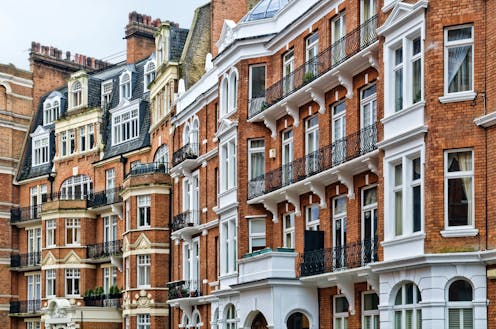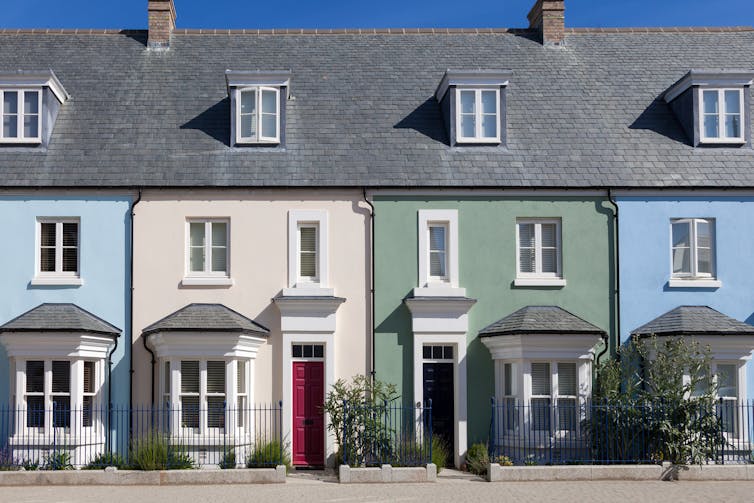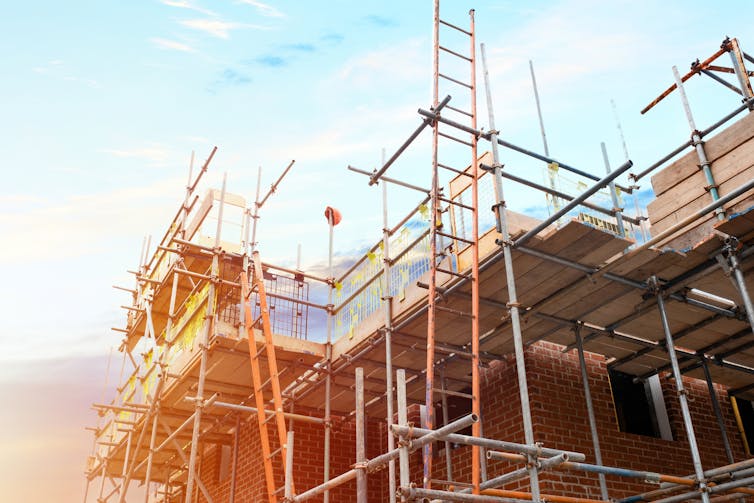
The UK government is introducing plans to reform the system of leasehold property in England and Wales to parliament. The leasehold and freehold reform bill aims to empower leaseholders and achieve greater fairness in the housing market.
The leasehold market comprises of about 4.7 million dwellings – 23% of the private housing stock in England. Most apartments (81%) are owned as leaseholds.
Research I have done with my colleague James Culley suggests that the reform proposed could have unintended negative consequences on leasehold prices, housing affordability and household wealth.
A leasehold is a legal contract conferring the owner of a dwelling the exclusive rights to occupy or let it for the duration of their lease. When a leasehold expires, the right reverts to the dwelling’s freeholder.
Compared to an identical freehold dwelling, leaseholds lose their value as the lease length shortens, while the value of the freehold interest of the same property rises. The leasehold is thus what is known as a “deteriorating asset”.
A lease can contain additional clauses including paying the freeholder (who owns the land on which the building is built) what is known as an annual ground rent. The freeholder is also responsible for maintaining the land, the building and its common parts and addressing any issues concerning the local community.
Currently, leaseholders can pay a premium to either extend their lease by an additional 90 years and stop paying ground rent or to acquire the freehold in full. This premium rises as the lease length shortens.

What reform has been proposed?
The proposed bill bans building new leasehold houses. It also seeks to give leaseholders greater control over the management of their building, along with a proposed “redress” schemes to allow leaseholders to challenge unfair freeholder fees. Subject to a further consultation, there is the possibility of introducing a cap on onerous ground rents in existing leases.
Crucially, the bill plans to reduce the premium (for buying out a freehold or extending a lease) and to standardise the extended lease length, from the current 90 years to 990 years.
The 2020 valuation report from statutory independent body the Law Commission explored ways to reduce the leasehold premium, including abolishing what is known as the “marriage value” component. That action would mean the premium wouldn’t fully reflect the value of a short leasehold (80 years or less remaining) if it were to be extended.

How would this affect property values?
Broadly, making it cheaper for leaseholders to extend their lease or buy the freehold on their property would, in effect, lead to windfall gains for leaseholders. Existing freeholders, by contrast, will lose out.
If a leasehold is extended to, say, 990 years, its value would increase to almost the level of the freehold. What’s more, reducing the premium would make it more attractive for existing and prospective leaseholders to extend or purchase an expiring lease. This would increase demand for leasehold properties, which in turn would see leasehold prices rise.
The gains from this won’t be evenly spread, however. If short leaseholds become much cheaper to extend, then they will rise significantly in value. Longer leases, by contrast, will see a lower increase in value because the reduction in the cost of extending them will be lower and they are already closer to the freehold value.
Freeholders, however, will significantly lose out because they will receive less money from the renewed lease or the sale of their freehold.
What does this mean for the housing market?
The reforms are likely to worsen housing affordability, particularly in urban areas where there is a high proportion of shorter leasehold stock. Research estimates that the short and long-term impact nationally, based on abolishing the marriage value alone, is a 1.0% and 3.2% rise in leasehold prices.
The impact on leasehold prices is likely to vary regionally – due to variations in the stock of leasehold dwellings, lease lengths and the general price of housing. Our research shows that the biggest decrease in housing affordability if all short leaseholds are extended, would occur in north-east England, the west Midlands and Wales.
There may be implications for the private rented sector too. Approximately 40% of leasehold dwellings are rented out privately, with a significant proportion to low-income households.
If the reforms induce leasehold landlords to either sell up (to realise the windfall gain) or to refurbish the property after an extension (to achieve a higher rental value), this has implications for the wider housing market.
It could decrease the supply of rented accommodation to this income group, and, in turn, would put pressure on an already pressurised private rental market. And even though it would lead to more supply in the market for leaseholds, the price for each leasehold would be higher and so less affordable.
Our research shows those who stand to gain the most from these windfall gains are existing owner-occupier leaseholders (mainly middle-income and a significant minority of higher-income households) and landlord leaseholders. If the marriage value is abolished, then owners of short leases will benefit most financially. By contrast, freeholders will lose out.
The government’s stated aim, in reforming leasehold, is to achieve fairness in the housing market. However, part of the current proposals focus on making the premium for buying or extending a leasehold cheaper – not more transparent and fairer. This risks making housing even less affordable and reinforcing wealth inequalities.
Mark Andrew in the past had received funding from the ESRC (note: it's not relevant to this research).
This article was originally published on The Conversation. Read the original article.







